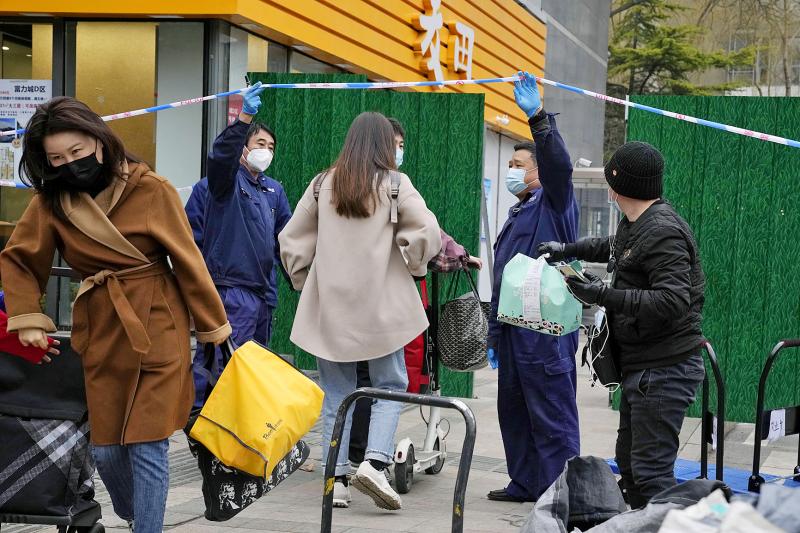Millions of people across China endured lockdowns yesterday as virus cases doubled to nearly 3,400 and anxiety mounted over the resilience of the country’s “zero COVID” approach in the face of the worst outbreak in two years.
A nationwide surge in cases has seen authorities close schools in Shanghai and lock down central neighborhoods in the southern tech powerhouse of Shenzhen as well as whole northeastern cities, as almost 18 provinces battle clusters of the Omicron and Delta variants of SARS-CoV-2.
The city of Jilin, center of the outbreak in the northeast, was partly locked down on Saturday, while residents of Yanji, an urban area of nearly 700,000 bordering North Korea, were confined to their homes yesterday.

Photo: AP
China has maintained a strict “zero COVID” policy enforced by swift lockdowns, travel restrictions and mass testing when clusters have emerged. However, the latest flare-up, driven by the Omicron variant and a spike in asymptomatic cases, is testing the efficacy of that approach.
Zhang Yan, an official at the Jilin provincial health commission, conceded that local authorities’ virus response so far had been lacking.
“The emergency response mechanism in some areas is not robust enough,” he said at a press briefing yesterday. “There is insufficient understanding of the characteristics of the Omicron variant ... and judgement has been inaccurate.”
Residents of Jilin have completed six rounds of mass testing, with the city reporting more than 2,200 cases of the Omicron variant since Saturday. The neighboring city of Changchun — an industrial base of 9 million people — was locked down on Friday, while at least three other small cities have been locked down since March 1.
The mayor of Jilin and the head of the Changchun health commission were dismissed from their jobs on Saturday, state media reported, in a sign of the political imperative placed on local authorities to contain virus clusters.
In Shenzhen, the southern city of around 13 million bordering Hong Kong, residents have been caught between nerves at a renewed outbreak and angst at the swift, draconian measures to squash clusters.
“It’s the worst since 2020,” a Shenzhen resident surnamed Zhang told reporters. “The closures are too sudden, my friend woke up in the morning to find her building was sealed overnight without warning. Her boss had to mail her laptop to her.”
The Shenzhen subdistrict of Futian, which was locked down yesterday, is home to 300,000 people and a thriving commercial district. It shares a land border crossing with Hong Kong, where the caseload over recent weeks has soared, alarming officials in Beijing.
In China’s biggest city, Shanghai, authorities have increasingly moved to temporarily lock down individual schools, businesses, restaurants and malls over close-contact fears rather than using mass quarantines. Long lines have been seen outside hospitals in the city as people rush to obtain a negative COVID-19 test.
As cases rise, the country’s National Health Commission announced on Friday that it would introduce the use of rapid antigen tests.
The kits will now be available online or at pharmacies for clinics and ordinary citizens to buy for “self-testing,” the health commission said.
Although nucleic acid tests will continue to be the main method of testing, the move suggests China might be anticipating that official efforts will not be able to contain the virus.

Philippine President Ferdinand Marcos Jr has fired his national police chief, who gained attention for leading the separate arrests of former Philippine president Rodrigo Duterte on orders of the International Criminal Court and televangelist Apollo Carreon Quiboloy, who is on the FBI’s most-wanted list for alleged child sex trafficking. Philippine Executive Secretary Lucas Bersamin did not cite a reason for the removal of General Nicolas Torre as head of the 232,000-member national police force, a position he was appointed to by Marcos in May and which he would have held until 2027. He was replaced by another senior police general, Jose

STILL AFLOAT: Satellite images show that a Chinese ship damaged in a collision earlier this month was under repair on Hainan, but Beijing has not commented on the incident Australia, Canada and the Philippines on Wednesday deployed three warships and aircraft for drills against simulated aerial threats off a disputed South China Sea shoal where Chinese forces have used risky maneuvers to try to drive away Manila’s aircraft and ships. The Philippine military said the naval drills east of Scarborough Shoal (Huangyan Island, 黃岩島) were concluded safely, and it did not mention any encounter with China’s coast guard, navy or suspected militia ships, which have been closely guarding the uninhabited fishing atoll off northwestern Philippines for years. Chinese officials did not immediately issue any comment on the naval drills, but they

POWER CONFLICT: The US president threatened to deploy National Guards in Baltimore. US media reports said he is also planning to station troops in Chicago US President Donald Trump on Sunday threatened to deploy National Guard troops to yet another Democratic stronghold, the Maryland city of Baltimore, as he seeks to expand his crackdown on crime and immigration. The Republican’s latest online rant about an “out of control, crime-ridden” city comes as Democratic state leaders — including Maryland Governor Wes Moore — line up to berate Trump on a high-profile political stage. Trump this month deployed the National Guard to the streets of Washington, in a widely criticized show of force the president said amounts to a federal takeover of US capital policing. The Guard began carrying

Ukrainian drone attacks overnight on several Russian power and energy facilities forced capacity reduction at the Kursk Nuclear Power Plant and set a fuel export terminal in Ust-Luga on fire, Russian officials said yesterday. A drone attack on the Kursk nuclear plant, not far from the border with Ukraine, damaged an auxiliary transformer and led to 50 percent reduction in the operating capacity at unit three of the plant, the plant’s press service said. There were no injuries and a fire sparked by the attack was promptly extinguished, the plant said. Radiation levels at the site and in the surrounding